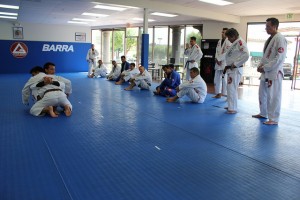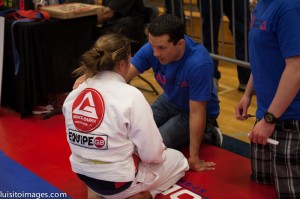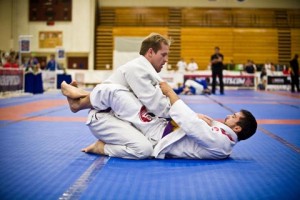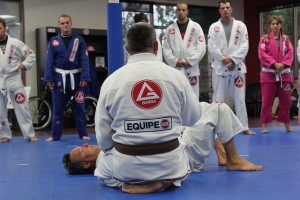5 Obstacles to Overcome in Your BJJ Training
In a perfect BJJ world, every training session would see new breakthroughs, energetic rolls where you submit every opponent and leave the mat without a scratch, already eager for the next session.Unfortunately we have other commitments in our lives and have to find a way to balance training with our other obligations. Even professional fighters have their own obstacles to deal with, even when it seems they have the ideal training situation.
Here are 5 obstacles most of us have dealt with at some time or another:
1) Lack of a qualified instructor
 BJJ has spread significantly in the last several years, globally, with more black belt instructors than at any point in the past. But for those who live in some countries where the growth has been slower, or even people who live in smaller centers of population, they may not have access to a qualified black belt professor of jiu-jitsu and an established bjj academy.
BJJ has spread significantly in the last several years, globally, with more black belt instructors than at any point in the past. But for those who live in some countries where the growth has been slower, or even people who live in smaller centers of population, they may not have access to a qualified black belt professor of jiu-jitsu and an established bjj academy.
If the desire to train is there, they find a way. Setting up puzzle mats in a community hall or friend’s garage, people all over the world find a way to learn some bjj techniques and get their roll on!
YouTube is a great resource for those without direct instruction from a black belt instructor.
2) Injuries
 Perhaps the most difficult part of training bjj over a period of time is the possibility of training injuries. Even professional level bjj fighters have to contend with this reality. Despite having access to the best sports nutrition, supplements, best physical trainers, time to recover and many other factors, the human body is not indestructible.
Perhaps the most difficult part of training bjj over a period of time is the possibility of training injuries. Even professional level bjj fighters have to contend with this reality. Despite having access to the best sports nutrition, supplements, best physical trainers, time to recover and many other factors, the human body is not indestructible.
The key is to allow enough time for the injury to heal itself without risk of re-injury and prolonging your absence from the mat. If your injury is going to require a longer period off of training, there is a danger that you could not return to training due to lost momentum.
Make the most positive use of the time away to study instructional and perform whatever conditioning may be possible for you, so you are ready to resume training once the injury has healed sufficiently.
3) Lack of Motivation
One of the most discussed topics on bjj internet forums is lack of training motivation. If you have been training for any length of time, you have no doubt had bouts where motivation to get to the academy is challenging.
 Sometimes the answer is a needed training break. Small, nagging injuries, life problems and a feeling of lack of progress can compound to rob you of your enthusiasm. I have found that a week away from training allows the mind a break, the small aches to subside, and my hunger to train returns.
Sometimes the answer is a needed training break. Small, nagging injuries, life problems and a feeling of lack of progress can compound to rob you of your enthusiasm. I have found that a week away from training allows the mind a break, the small aches to subside, and my hunger to train returns.
Most sports have some element of periodization to them – if not complete off seasons – and so you need to monitor yourself for signs of overtraining. Take a week if you feel you need it and before you know it you will start to miss your buddies and the challenge of rolling.
4) Training Plateaus
Our growth in any part of life is not a steady, interrupted upward progression. It is interrupted by frustrating plateaus where you might even feel that you regress! You will also recall periods where the technique flowed, you were suddenly pulling off  techniques that have always been a challenge and life feels great.
techniques that have always been a challenge and life feels great.
Part of being an experienced bjj practitioner is recognizing that our training has ups and downs. One of the best ways to break a training plateau is to decide to specialize on an area of your game to kick start your progress. For the next month devote your focus to a certain style of guard or learning all you can about the kimura and deepen your knowledge in one small area.
5) Lack of Time
This is a difficult one. Most of us juggle multiple commitments to work, friends, family and other hobbies. But somehow those who really want to train find a way to get in some rolling a couple of times a week.
 A group of students at one academy felt that the best way for them to get in a few sessions per week was to train at 6am before rush hour traffic and before they had to be at work. While most of us ideally would train as many days as we could fit in, I tell students that it is possible for them to improve with two training sessions per week.
A group of students at one academy felt that the best way for them to get in a few sessions per week was to train at 6am before rush hour traffic and before they had to be at work. While most of us ideally would train as many days as we could fit in, I tell students that it is possible for them to improve with two training sessions per week.
We all only have 24 hours in a day and sometimes we have to say no to other things to make time for our bjj.
Credits: Mark Mullen
Gracie Barra Black belt based in Taipei, Taiwan
Twitter: @MarkMullenBJJ
